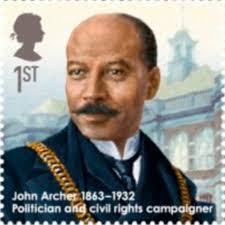|
John Richard Archer was born on June 8th, 1863 in Liverpool, England; his parents were Richard Archer and Mary Burns. Richard Archer was a black man from Barbados and Mary Burns was and Irish woman living in England. Archer was able to see the world when he joined the British Navy, as a seaman his travels would allow him to take up residence in the United States and Canada. While living in Canada Archer would meet and marry a black Canadian woman named Bertha. He also opened a small photography shop during the time when photography was only around roughly 60 years (Photography was introduced to the world in 1939). Archer gained an interest in the local politics of London by becoming acquainted with the social activists who were labeled “radicals”. This affiliation led Archer to being elected as the Progressive to the Battersea Borough Council for the Latchmere ward in 1906. As the progressive to Battersea, he successfully campaigned for a minimum wage of 32 shillings a week for the council workers. Unfortunately, he was not reelected as the progressive until 1909, but his campaign in 1912 allowed him to once again be elected as the Progressive for Battersea. In 1913, Archer was nominated and won the election for the seat as the mayor of Battersea, London. Archer was the first black mayor in London’s history, but the second black British Mayor. Archer quoted the following during his victory speech: “My election tonight means a new era. You have made history tonight. For the first time in the history of the English nation a man of color has been elected as mayor of an English borough. “That will go forth to the colored nations of the world and they will look to Battersea and say Battersea has done many things in the past, but the greatest thing it has done has been to show that it has no racial prejudice and that it recognizes a man for the work he has done.” In 1919, he was re-elected to the Battersea Counsel but he was representing the Labor Party, which was a broad church bringing together an alliance of social-democratic, socialist and trade-unionist outlooks. He would become the president of the African Progress Union in 1918, a union that worked for black equality and empowerment in London. In 1919, he served as a British delegate to the Pan-African Congress in Paris, France; he would follow this event with his own Pan-African Congress in London two years later. In 1922, Archer would step down from his position as progressive of the Battersea Borough Council to help Shapurji Saklatvala campaign for the position. He used his influence to convince the Labor Party to endorse Saklatvala while he became one the first black members of parliament in London’s history. Saklatvala was a communist activist standing for parliament in North Battersea before collaborating with Archer, he became the Progressive for Battersea in 1922 and 1924 with the help of Archer. The Labor Party would eventually split shortly after 1924; Archer would become the agent for the person who defeated Saklatvala in the 1929 election for the Progressive of Battersea. Later in his life Archer would become the governor of the Battersea Polytechnic Institute, which is now The University of Surrey, a public research university located in Guildford, Surrey, in the South East of England, United Kingdom. He would also become the President of the Nine Elms Swimming Club, Chair of the Whitley Council Staff Committee, and a member of the Wandsworth Board of Guardians. In 1931, he was reelected for the Nine Elms Award just before his death in July of 1932. During the time of his death he was the deputy leader of the Battersea counsel. Archer was following in the footsteps of Mr. Allen Glaisyer Minns, the first black British mayor. Archer used his platforms to help fight for justice and equality for the black people of London. He believed in challenging the system to get results that helped change the conditions of his people. Black British history is not taught at all within our school systems or any other historical medium, it is a great tragedy because we are unaware of the struggles and accomplishments of our people across the pond. The story of Archer is an example of black excellence in Europe, as well as, a reminder of how much more we have to learn about our history. Mr. John Richard Archer, we proudly stand on your shoulders. J.A. Ward References:
https://en.wikipedia.org/wiki/John_Archer_(British_politician) http://originalpeople.org/john-richard-archer-britains-first-black-mayor-1913/
1 Comment
Sean Creighton
9/28/2021 08:45:16 am
My 2014 biography of Archer 'John Archer.Battersea's Black Progressive and Labour Activist 1863-1932' is available from me at [email protected]
Reply
Leave a Reply. |
Details
Categories
All
Click Here to join our mailing list
|
Contact Us: |
Connect With Us |
Site powered by PIT Web Design


 RSS Feed
RSS Feed



